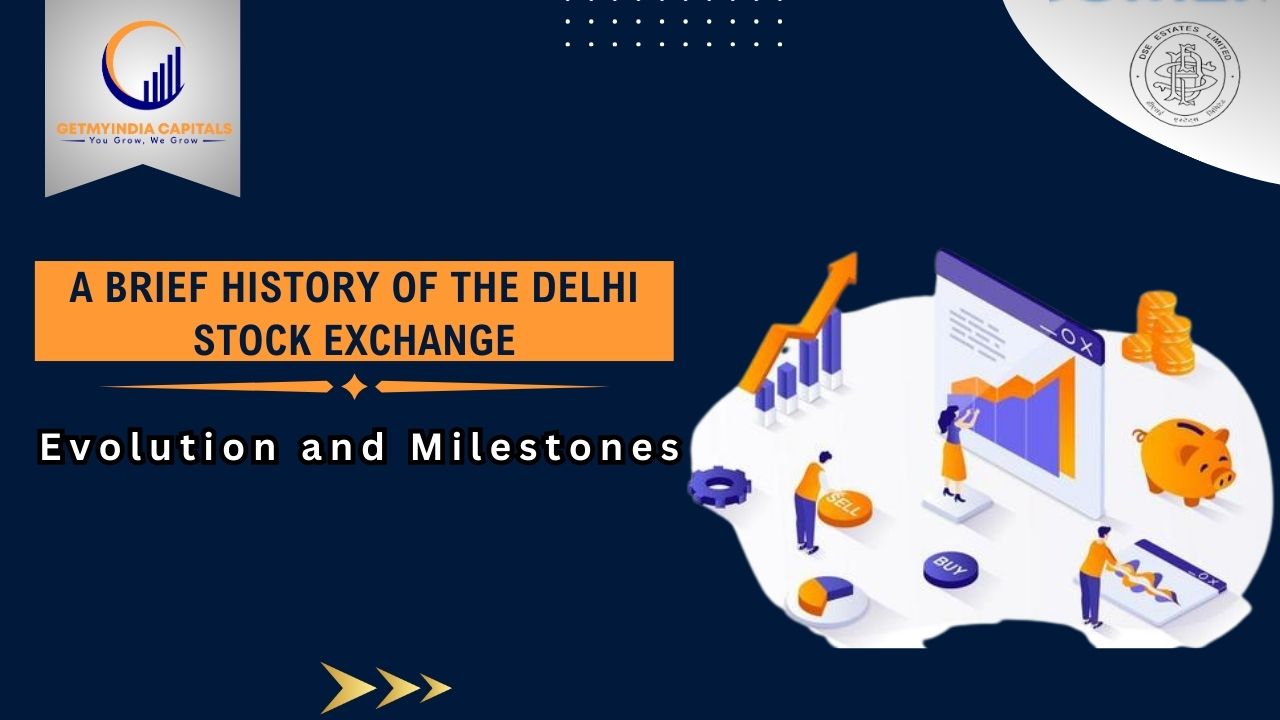Introduction to Delhi Stock Exchange
DSE ESTATES LIMITED (Formerly known as Delhi Stock Exchange Limited (DSE) is one of the oldest Stock Exchanges in the country, was established in the year 1947, the year of Indian Independence. Since then, it has played a key role in the development of the economy by facilitating investments in different sectors, thereby creating a reasonably encouraging equity cult in the northern belt of India. DSE, from the inception, has been helping the companies around, in terms of creation of capital and net-worth. It has contributed in its inimitable way, in spreading financial literacy amongst the larger populace. The exchange is an amalgamation of Delhi Stock and Share Brokers’ Association Limited and the Delhi Stocks and Shares Exchange Limited. It was India’s fifth exchange and was one of the premier stock exchanges in India. At its peak, the DSE had over 3,000 listed companies. It was well-connected across North India with terminals in 50 cities, facilitating trading for its members.
Incorporation of Delhi Stock Exchange
The Delhi Stock Exchange was incorporated on June 25, 1947, coinciding with India’s independence. Over the years, DSE underwent several transformations, including demutualization in 2007-08 to achieve a minimum public holding of 51%. However, due to challenges such as low trading volumes and regulatory issues, it ceased trading operations in 2014 and was officially allowed to exit as a stock exchange by SEBI in 2017. The entity was renamed DSE Estates Limited in 2019.
Mission and Vision of Delhi Stock Exchange
- Mission: To provide cost-effective, transparent, and single-window services to stakeholders.
- Vision: To become a globally recognized stock exchange while fostering financial literacy and creating a nation of well-informed investors.
Services of Delhi stock Exchange
During its operational years, the Delhi Stock Exchange offered various services:
- Securities Trading Platform:
- Equity trading for shares.
- Trading in debt instruments like government and corporate bonds.
- Mutual fund trading.
- Derivatives trading (futures and options).
- Listing Services:
- Facilitating company listings to raise capital.
- Assisting with Initial Public Offerings (IPOs).
- Investor Services:
- An Investor Protection Fund to safeguard against defaults or disputes.
- Educational programs to promote informed investment decisions.
- Market Infrastructure:
- Provided connectivity for trading on platforms like NSE and BSE.
- Offered depository services as a participant of Central Depository Services Limited (CDSL)
Founder details
Vijay Bhushan served as the President of Delhi Stock Exchange from 2001 to 2002. Mr. Bhushan holds an MBA degree from the University of Delhi.Vijay Bhushan is currently a Non-Independent Non-Executive Director at Bharat Bhushan Finance & Commodity Brokers Ltd., a Director at Bharat Bhushan Technologies Pvt Ltd., a Director at Bharat Bhushan Insurance Brokers Pvt Ltd., and a Director at Bharat Bhushan Equity Traders Ltd. Previously, he served as the Chairman of Federation of Indian Stock Exchanges from 2002 to 2004.He was also a Director at Bharat Nidhi Ltd., the President & Director of Association of National Exchanges Members of India, an Independent Non-Executive Director at Paramount Communications Ltd.from 2000 to 2024, and an Independent Non-Executive Director at KEI Industries Ltd.from 1994 to 2024.
Funding of Delhi Stock Exchange
DSE initialised its Rs. 1.25 billion Trade Guarantee Fund on 27 July 1998. TGF guarantees all the transactions of the DSE interse through the stock exchange. If a member fails to honour the settlement commitment, TGF undertakes to fulfil the commitment and complete all the settlement without disruption.
Growth and Revenue
|
Particulars |
31-03-23 | 31-03-22 |
| Revenue from Operations | 5,868 |
5,747 |
|
Other Income |
9,42,155 | 92,018 |
| Total Income | 9,48,023 |
97,765 |
|
Expenses |
||
| Employee Benefits Expense | 6,282 |
5,654 |
|
Finance Costs |
477 | 135 |
| Depreciation\Amortization | 3,351 |
3,397 |
|
Other Expenses |
18,834 | 26,516 |
| Total Expenses | 28,944 |
35,702 |
|
Profit for the year before tax |
1,90,079 |
62,063 |
Competitors of Delhi Stock Exchange
- Metropolitian Stock Exchange of India (MSE)
- National Stock Exchange of India (NSE)
- National Stock Exchange – IFSC Limited (NSE-IFSC)
- Calcutta Stock Exchange of India (CSE)
- Multi Commodity Exchange of India Limited
- National Commodity & Derivative Exchange Limited
Conclusion
DSE has set an ambitious path of reviving its trading operations soon backed by the global technology and skills matching the best in the Industry. DSE intends to channelize its productive resources towards contributing significantly to the growth of the Capital Market in India. In conclusion, the Delhi Stock Exchange (DSE) played a pivotal role in shaping the financial landscape of northern India by promoting investments, facilitating economic growth, and fostering financial literacy. Established in 1947, it was one of India’s oldest and most prominent stock exchanges, offering a comprehensive range of services, including securities trading, listing services, and investor protection initiatives. Despite its significant contributions and efforts to modernize through demutualization, DSE faced challenges such as declining trading volumes and regulatory hurdles, which ultimately led to the cessation of its operations in 2014 and its official exit in 2017. Renamed as DSE Estates Limited in 2019, its legacy remains as a testament to its historical importance in India’s financial ecosystem.
GetMyIndia.com RaysVeda.com GetMyStartup.com LawCanal.com ABHAYRAY.COM ZinCob.com

